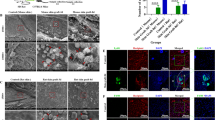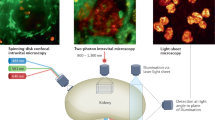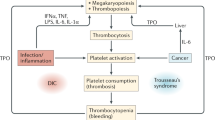Abstract
THE rejection of skin allografts depends on an immunological response of the recipient1 which can be transferred with whole cells2. The contribution of soluble antibody to rejection of solid tissue grafts remains an open question3. Although antibody may react directly with donor cells to produce a cytotoxic effect, other destructive mechanisms are equally possible. For example, Gardner, Guttman and Merrill4 have observed an ischaemic response during rejection of rat kidney transplants. Indeed, interference with the blood supply leading to cell destruction in grafts undergoing rejection has previously been deduced from metabolic studies5,6. Such vascular blockades could be produced by platelet aggregates, as noted by Porter7 in acute rejection of human kidney transplants. The work reported here shows that substantial numbers of platelets accumulate in dog kidneys within minutes of renal transplantation to sensitized recipients. These platelets may be important contributors to the set of reactions responsible for allotransplant rejection8,9.
This is a preview of subscription content, access via your institution
Access options
Subscribe to this journal
Receive 51 print issues and online access
$199.00 per year
only $3.90 per issue
Buy this article
- Purchase on Springer Link
- Instant access to full article PDF
Prices may be subject to local taxes which are calculated during checkout
Similar content being viewed by others
References
Medawar, P. B., J. Anat., 78, 179 (1944).
Mitchison, N. A., Nature, 171, 267 (1953).
Stetson, C. A., Immunology, 3, 97 (1963).
Gardner, L. B., Guttman, R. D., and Merrill, J. P., Transplantation, 6, 411 (1968).
Nathan, P., Foulkes, E. C., Wilchins, L. J., and Miller, B. F., Proc. Soc. Exp. Biol. and Med., 111, 207 (1962).
Gonzales, E. E., Nathan, P., and Miller, B. F., Ann. NY Acad. Sci., 99, 795 (1962).
Porter, K. A., suppl., J. Clin. Pathol., 20, 518 (1967).
Lowenhaupt, R., and Nathan, P., J. Cell Biol., 35, 83a (1967).
Nathan, P., and Lowenhaupt, R., Fed. Proc., 27, 442 (1968).
Chambers, R. W., Bowling, M. C., and Grimley, P. M., Arch. Pathol., 85, 18 (1968).
Millonig, G., Fifth Intern. Cong. Electron Microsc. (Academic Press, 1962).
Gorer, P. A., Ann. NY Acad. Sci., 59, 365 (1954).
Movat, H. Z., Mustard, J. F., Taichiman, N. S., and Uriuhara, T., Proc. Soc. Exp. Biol. and Med, 120, 232 (1965).
Yamada, T., and Kay, J. H., Surgery, 63, 637 (1968).
Spaet, T. H., and Zucker, M. B., Amer. J. Physiol., 206, 1267 (1964).
Waalkes, T. P., Weissbach, H., Bozicevich, J., and Udenfriend, S., J. Clin. Invest., 36, 1115 (1957).
Author information
Authors and Affiliations
Rights and permissions
About this article
Cite this article
LOWENHAUPT, R., NATHAN, P. Pletelet Accumulation observed by Electron Microscopy in the Early Phase of Renal Allotransplant Rejection. Nature 220, 822–825 (1968). https://doi.org/10.1038/220822b0
Received:
Revised:
Issue Date:
DOI: https://doi.org/10.1038/220822b0
Comments
By submitting a comment you agree to abide by our Terms and Community Guidelines. If you find something abusive or that does not comply with our terms or guidelines please flag it as inappropriate.



